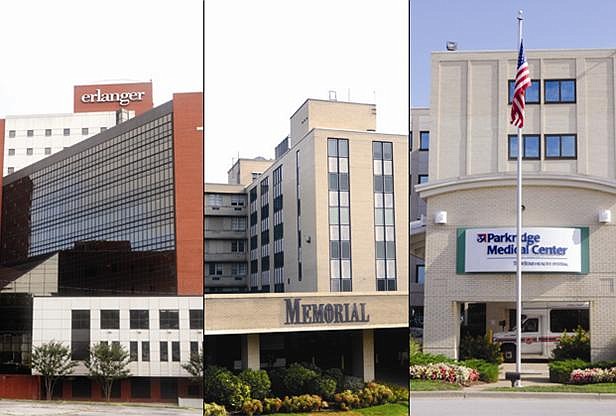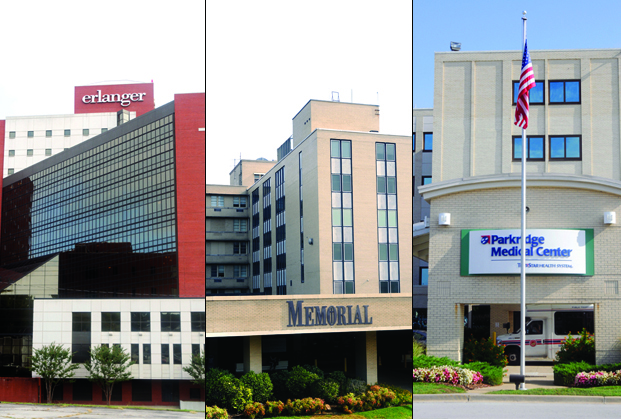Georgia hospital provider feesFiscal year 2010-2011// Provider fee // Medicaid add-on // DifferenceGordon Hospital // $806,258 // $990,075 // $183,817Hamilton Medical Center $2,354,245 // $2,358,717 // $4,472Murray Medical Center $247,011 // $57,972 // $189,038Erlanger at Hutcheson $1,309,703 // $1,052,522 // $257,180Total Georgia fees: $215 millionAdditional Medicaid funding: $590 millionSource: Georgia Department of Community HealthTennessee hospital provider feesFiscal year 2011-12Tennessee does not track individual hospitalsTennessee total fees: $452 millionAdditional Medicaid funding: $800 million** EstimatedSource: Tennessee Hospital Association
Recently implemented hospital provider fees in Georgia and Tennessee have created "winners and losers" among hospitals, some experts say, but it is unlikely either state will abolish the fees next year.
"A lot of alternatives are being discussed, but it is safe to say the state is still in a predicament when it comes to Medicaid funding," said Kevin Bloye, with the Georgia Hospital Association. "The system has created a group of winners and losers throughout the state - our goal would be to find ways to reduce some of the significant losses to some of our members."
The fees are used to pull down millions more in federal dollars for both states and prevent cuts to their Medicaid programs. But even though hospitals benefit from the federal funds, some hospitals pay in more than they get back.
Numbers released last week by the Georgia Department of Community Health show that some hospitals such as Grady Memorial and Children's Healthcare in Atlanta received millions more in reimbursement than they paid in fees, while several Northwest Georgia hospitals got back significantly less than they paid.
In Tennessee, the Tennessee Hospital Association said it does not track individual hospital numbers. The association plans to see if the state will pick up some of the balance next year, but THA President Craig Becker said it is likely hospitals will have to pay some of the tab.
"It's really the state's responsibility, but it looks like we will renew it again," Becker said, talking about the provider fees.
Laws to implement the fees will expire on June 30, 2013, in both states.
Georgia implemented the fees for fiscal years 2011-13, requiring hospitals to pay 1.45 percent of their net patient revenue. Tennessee assesses a 3.52 percent fee of net patient revenues, a measure that has been renewed on an annual basis.
Both states use the fees to draw federal matching Medicaid funding, which then goes to pay state Medicaid insurance programs for disabled and low-income people. In the past, state funding had been used for the draw-down, but during the economic downturn Georgia and Tennessee said they no longer had the money.
However, under the system in place now, hospitals that have a high percentage of Medicaid patients benefit from the fees, while those with fewer Medicaid patients do not. For example, Erlanger at Hutcheson paid in $257,180 more than it got back in fiscal year 2011. The public hospital has lost millions in the last few years and continues to struggle financially.
Hutcheson CEO Roger Forgey declined to comment about the fees.
Murray Medical Center, the small public hospital in Murray County, Ga., paid out $189,000 more than it got back. The hospital recently separated from Hamilton Medical Center in Dalton, Ga., and the fees have been a significant cost, CEO Roy Orr said.
"Losing that much is a major impact for us," Orr said. "It does hamper our ability to grow, and additional hits will compound the problem."
Orr said his hospital is a vital community asset, however, with a high unemployment rate in Murray County, it sees a lot of patients who can't pay their bills.
"We take care of anyone that comes; I think the state needs to make sure hospitals get back more than they pay [in fees]," he said.
Bloye said the hospital association is discussing various options, hoping to lessen the impact on hospitals that are losing significant amounts of money. But right now the state is waiting to determine what it will do with its Medicaid system under the federal health care law.
"It's going to be a challenge, but we are looking at it from all angles," he said.
In Tennessee, Erlanger Health System - as a public hospital - is not required to pay the fee, but it does benefit from the additional TennCare money. Memorial Health Care System officials said they paid $18.2 million, but received that amount back in reimbursements. Numbers were not available from Parkridge Medical Center.
There is no alternative to the fees because not drawing the money would mean devastating cuts to the TennCare program, Becker said.
"Erlanger couldn't survive without it," he said. "But it's clear the economy is turning around and the state has additional dollars. We'll see what they can do."

